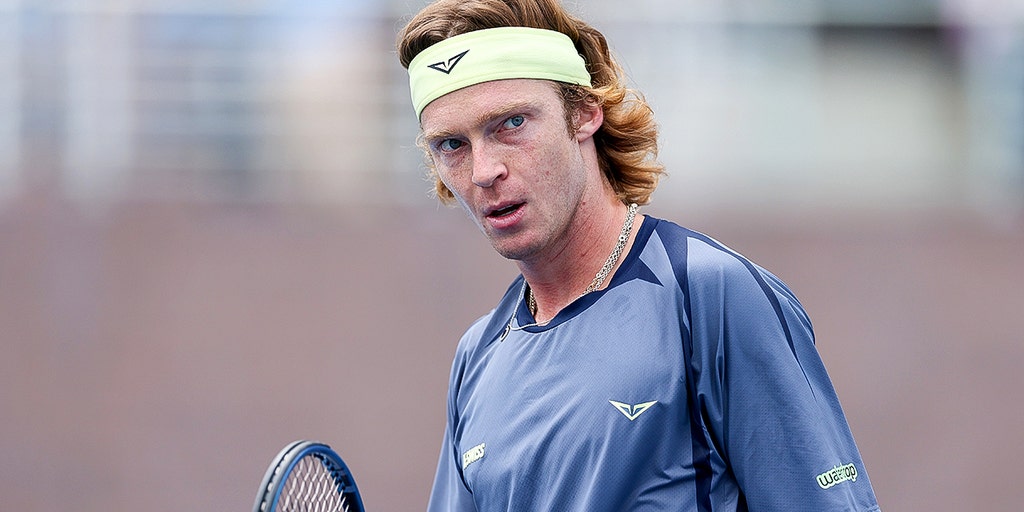Andrey Rublev criticizes $3,000 U.S. Open fine for profanity, says self-directed expletives should not be penalized
Russian No. 15 seed Andrey Rublev said tournament officials were wrong to fine him for words he says were directed at himself, not at opponents or officials.
Andrey Rublev criticizes $3,000 U.S. Open fine for profanity, says self-directed expletives should not be penalized
Russian No. 15 seed Andrey Rublev said tournament officials were wrong to fine him for words he says were directed at himself, not at opponents or officials.
Andrey Rublev, the No. 15-ranked man in singles, criticized a $3,000 fine levied by U.S. Open officials after what tournament authorities termed foul language during his second-round match against American Tristan Boyer. Rublev said the sanction was unfair because the language, he maintained, was directed inward during an intense moment of competition rather than aimed at an official, opponent or spectators.
“Depends on the situation,” Rublev said, according to The New York Post and reported by Fox News, after advancing from the third round in a five-set match on Saturday. “When you are talking to yourself in a bad way, it’s my decision how I do it. You cannot, in my opinion, you cannot charge for this. If you talk to the referee or umpire with bad words, yes, like when you do it towards someone or you scream on all courts, yes, obviously. But when you talk to yourself, it’s your decision how you talk. It doesn’t matter even if the umpire hears what you are saying or not for this. I don’t think so.”

Tournament officials did not immediately release a detailed explanation of the fine beyond the standard enforcement of the U.S. Open code of conduct. Grand Slam events, including the U.S. Open, have longstanding rules that allow officials to fine players for unsportsmanlike conduct, including audible profanity or actions deemed detrimental to the game. Penalties are typically applied when conduct is directed at officials, opponents or the crowd, or when it is otherwise judged to breach the tournament’s behavioral standards.
Rublev, a consistent presence in the ATP’s top 20 over recent seasons, has won multiple ATP titles and is known for his fiery on-court demeanor. In recent matches at Flushing Meadows, the Russian displayed both intensity and resilience, pushing through a tough third-round encounter that extended to five sets. He lodged his complaint after that victory, arguing that self-directed profanity — an emotional release between points or during solitary moments on court — should be treated differently than language aimed at others.
Tournament penalties for player conduct have been a source of debate within tennis for years, with observers and players sometimes at odds over where to draw the line between acceptable in-match emotion and punishable behavior. Supporters of strict enforcement argue that uniform rules are necessary to preserve professionalism and respect for officials and opponents, while critics say context matters and automatic fines can be overbroad when players are venting privately.
Rublev’s comments reflect that debate. He told reporters that penalizing a player for muttering to himself would represent an overreach and that responsibility lies with the player to control what they express toward others, not what they say privately under stress. He did not say whether he plans to appeal the fine.
The U.S. Open and the United States Tennis Association (USTA) have periodically released summaries of fines and code-of-conduct rulings in past years, detailing amounts and the nature of offenses, but tournament organizers do not always publish granular explanations for every sanction. In some cases, fines are imposed immediately on-site and recorded in match reports; in others, they can follow review by tournament officials.
Rublev’s stance is unlikely to be the final word on the issue. Tennis’ governing bodies — including tournament organizers, the ATP, the International Tennis Federation and national federations — have wrestled with how to balance maintaining decorum and respecting players’ emotional expressions. Players who believe a fine is unfair may seek appeal avenues through their national federation or through tournament appeal panels, depending on the specific rules and processes in place at the event.
For now, the practical impact on Rublev is monetary and reputational. A $3,000 fine is a relatively modest sum in the context of professional tennis earnings for a top-20 player, but the public dispute highlights tensions between enforcement officials and athletes over what constitutes punishable behavior. Rublev’s comments come as the U.S. Open progresses toward the latter rounds, where higher stakes and increased scrutiny can intensify both play and official oversight.
Rublev’s broader message — that self-directed profanity should not be equated with abusive language aimed at others — echoes a recurring conversation across sports about how to interpret heated, in-the-moment reactions by competitors. While some sports and leagues take a stricter stance against any public obscenity, others weigh context, intent and audience when deciding whether to sanction athletes.
As the tournament continues, attention will likely remain on how officials apply conduct rules and whether any players will contest fines they view as disproportionate. For Rublev, the immediate focus will be on his next match and on whether he pursues any formal appeal or further comment regarding the sanction.
Sources
- https://www.foxnews.com/sports/russian-tennis-star-andrey-rublev-sounds-off-us-open-fine-profanity-during-match